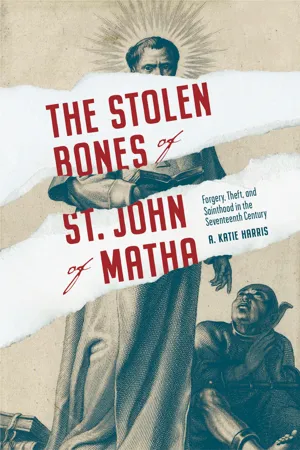
Iberian Encounter and Exchange, 475–1755
Forgery, Theft, and Sainthood in the Seventeenth Century
- English
- ePUB (mobile friendly)
- Available on iOS & Android
Iberian Encounter and Exchange, 475–1755
Forgery, Theft, and Sainthood in the Seventeenth Century
About This Book
On the night of March 18, 1655, two Spanish friars broke into a church to steal the bones of the founder of their religious institution, the Order of the Most Holy Trinity. This book investigates this little-known incident of relic theft and the lengthy legal case that followed, together with the larger questions that surround the remains of saints in seventeenth-century Catholic Europe.
Drawing on a wealth of manuscript and print sources from the era, A. Katie Harris uses the case of St. John of Matha's stolen remains to explore the roles played by saints' relics, the anxieties invested in them, their cultural meanings, and the changing modes of thought with which early modern Catholics approached them. While in theory a relic's authenticity and identity might be proved by supernatural evidence, in practice early modern Church authorities often reached for proofs grounded in the material, human world—preferences that were representative of the standardizing and streamlining of sixteenth- and seventeenth-century saint-making. Harris examines how Matha's advocates deployed material and documentary proofs, locating them within a framework of Scholastic concepts of individuation, identity, change, and persistence, and applying moral certainty to accommodate the inherent uncertainty of human evidence and relic knowledge.
Engaging and accessible, The Stolen Bones of St. John of Matha raises an array of important questions surrounding relic identity and authenticity in seventeenth-century Europe. It will be of interest to students, scholars, and casual readers interested in European history, religious history, material culture, and Renaissance studies.
Frequently asked questions
Information
Table of contents
- Cover
- Title Page
- Copyright
- Contents
- List of Illustrations
- Acknowledgments
- Prologue: The Crime
- 1. Relics and Relic Culture in Early Modern Europe
- 2. “Well, If They Are So Ancient, What Saints Do They Have?”: St. John of Matha in Trinitarian Tradition
- 3. Forgery and Sainthood in the Seventeenth Century
- 4. Uncertain Saint: The Case Before the Congregation of Sacred Rites
- 5. “A Very Difficult Business”: Proving the Bones of St. John of Matha in 1715 and 1721
- Epilogue
- Notes
- Bibliography
- Index